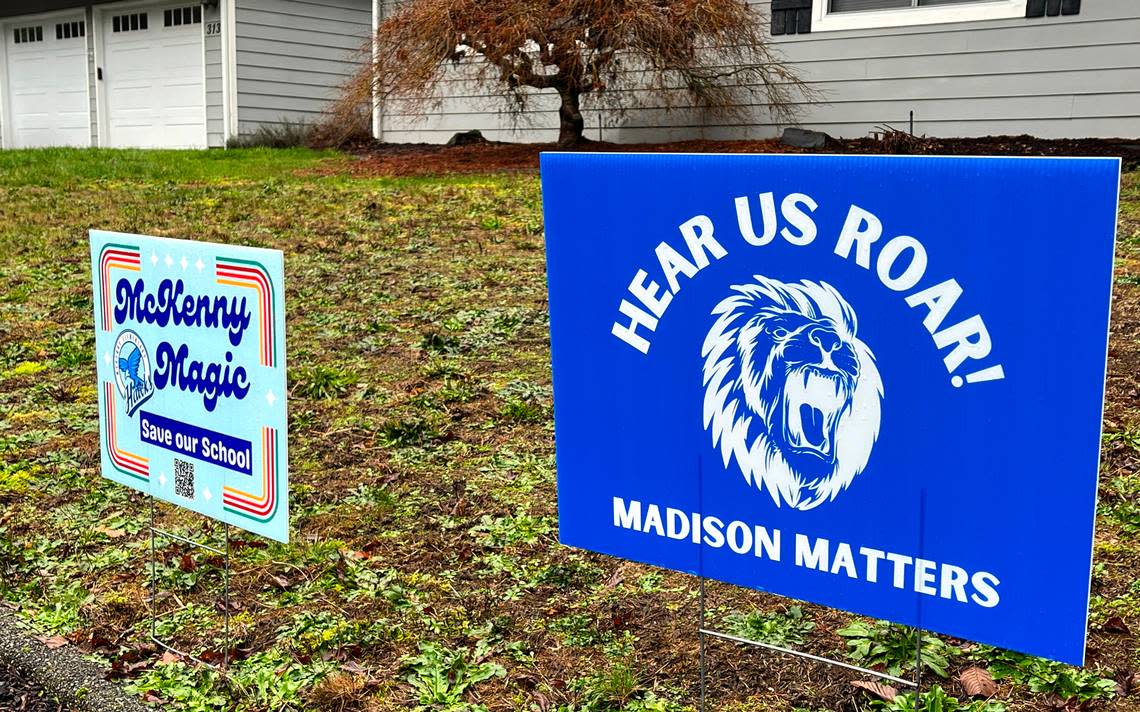Olympia community suggests options that could close budget gap without closing schools

The Olympia School Board hosted what it called a community solutions work session on Thursday, and the community came ready to offer solutions.
Directors had invited members of the public to submit ideas for improving school efficiency and bring in more revenue without making cuts to programs or closing schools. The meeting was scheduled after public hearings were conducted at Madison and McKenny elementary schools, the schools the district has proposed closing to deal with a $3.5 million budget deficit.
Board President Hilary Seidel began by reading ideas from people who couldn’t attend the meeting, but submitted ideas anyway.
Hattie Osborne, a school district staff member, suggested the district increase efficiency by reimagining the outdoor school program, including relocating the camp experience to some place closer, which would make it less expensive and more inclusive. The program now takes older elementary students to the 68-acre Cispus Learning Center in the Gifford Pinchot National Forest near Randle, nearly two hours away from Olympia.
Osborne also suggested constructing a series of day trips that are curated and designed to expand scientific knowledge without an overnight stay like they do at Cispus.
Alexa Silver suggested eliminating the nine remaining district positions that were initially hired through ESSER funds, which were emergency relief dollars from the federal government provided through the American Rescue Plan Act during the COVID-19 pandemic. Those positions include the mentor program, the family liaison program, early learning director and the native education director for a total savings of $664,000.
Another person suggested closing Boston Harbor Elementary to increase efficiency.
Colette Paulson suggested reducing administrative staff by six positions and returning to 2021-2022 pay levels. She also suggested decreasing centralized support for schools and hiring a grant writer to generate more revenue.
Joshua Hettena brought a slideshow to Thursday’s meeting depicting a staff rebalancing scenario to make all schools more efficient.
“It’s really intended to show whether there could be opportunities to redistribute the staffing within the district more efficiently, and it also allows us to now have as many staff per school to meet the budget challenge ahead,” Hettena said.
Hettena said rebalancing staffing across the district could save anywhere between $2 million and $6 million. He said if you exclude teaching and learning positions, the district could still save between $1 million and $3 million.
Hettena said he didn’t make any judgment calls in his analysis about the impact on students and teaching if classroom student-teacher ratios were to go up.
Penny Reck jumped off Hettena’s suggestions and focused on efficiencies at the administrative level.
“Looking at the central office, we know that it’s very important for people to run the district,” Reck said. “But there’s a lot of money going into there, and we haven’t heard anything about efficiencies targeting that section of employees.”
Reck said the district should be looking from the top down to make cuts so students and learning aren’t involved.
Including benefits, Reck said the central office administration receives about 8% of the yearly budget when it could be capped at 5%.
Reck didn’t have specifics on what positions could be cut from the central office to make up for the budget deficit.
Kelcy Shaffer is a former employee of the Department of Children, Youth and Families, said the district could generate more revenue by having a more robust Early Childhood Education and Assistance program.
Currently Madison Elementary is the only school in the district with a pre-kindergarten transitional program.
Shaffer said if the district contracted for just 200 school day slots for early learning, it could bring in $2.8 million.
Other community members asked the board to consider a multitude of other options, including offering additional contracted classes outside of normal school hours to bring in more money.
The Thursday night meeting was recorded and can be viewed online. The next OSD regular board meeting will be at 6:30 p.m. March 14.

